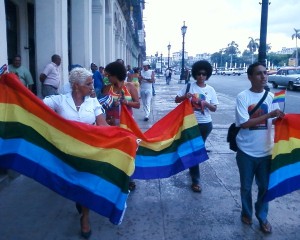Independent March in Front of the Capitol Demands Gay Marriage -- Lilianne Ruiz
translation submitted to and cross-posted from Translating Cuba
Independent LGBT activists marched before the Capitol this weekend — photo by Lilianne Ruiz
HAVANA, Cuba, July 2nd 2013, Lilianne
Ruiz / www.cubanet.org — In concurrence with Gay Pride Day, celebrated
worldwide every 28th of June, a dozen activists marched past the Capitol
last Saturday, led by Leannes Imbert Acosta, director of the LGBT
community’s Rights Observatory. Afterwards, they continued the march
towards the Paseo del Prado, carrying the rainbow flag.
At this event, the protesters wore slogans supporting marriage between persons of the same sex. Imbert Acosta had this to say:
“This year the march brings up the topic
of marriage between persons of the same sex. We are announcing the
beginning of a campaign to collect at least ten thousand signatures, in
order to later present a legal initiative before the National Assembly
of Popular Power to grant the right to enter into matrimony to same-sex
couples.”
The LGBT Observatory of Cuba since 2011
has called for the march around Gay Pride Day, not only for people in
the LGBT community, but also for any citizen who identifies with the
cause of ending discrimination on basis of sexual orientation.
Regarding this and other rights, Imbert Acosta stated:
“What we are asking for is not the right
to be gays or lesbians… We demand that, being gays and lesbians, the
State and society recognize the totality of our rights. One does not
lose one’s religious dimension, nor political, nor legal personality by
expressing a homosexual orientation. Sexuality is one human dimension,
just as are all the others. Historically we have been discriminated
against for cultural, religious, and political reasons. Nonetheless, a
homosexual person must also have the right to share in culture,
religion, and politics, as well as enter into matrimony, in the same way
and for the same reasons as would a heterosexual couple.”
Asked about the role of the CENESEX official (National Center of Sexual Education) in this sense, Acosta comments:
“Mariela Castro, daughter of the Cuban
president, serves more as a government spokesperson to the LGBT
community than as a representative of the LGBT community to the
government. It is a means of maintaining control. Hence many times the
title of political group stigmatizes us because we are not in
agreement with the Center that she directs. Nevertheless, we have tried
to build bridges for dialogue and they are the ones who have refused,
alleging that we visit diplomatic offices, to which we respond
that Mrs. Castro also does the same. We have talked with transsexuals
who are affiliated with the center and they tell us that they recognize
that CENESEX does not authentically represent the interests of the LGBT
community, but they allege that they need their operation (surgical sex change).
“On the other hand, Mrs. Castro does
call on the march for World Day Against Homophobia to dance the conga
with slogans in support of socialism, which as we all know is the
political system which her family heads. So, she is making a political
campaign with the interests of the community.”
Mariela Castro is currently deputy of
the National Assembly of Popular Power. She has expressed on multiple
occasions that CENESEX already put forth a draft bill before the
National Assembly, “But,” comments Imbert Acosta, “in every case, it
only contemplates civil recognition, not marriage as such. And that is
another of the matters that we wish to clarify today. At the least, we,
the non-officially allied LGBT activists of the island and many members
of the community, want marriage, not just a civil union law which would
leave us where we are situated, in a situation of disadvantage in
matters of rights compared to heterosexuals.”
Although it is true that the authorities
have not intervened directly against the protesters, it is known that
they have made warnings to possible participants to keep them from
marching.
A police warning can discourage many in a country with iron control by the State.
By Lilianne Ruiz
Tuesday, July 2, 2013
